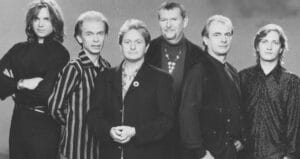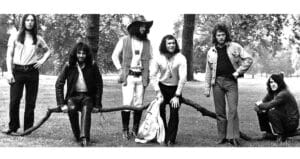Gong is one of the most influential rock acts of its era, known for shaping the sound and identity of modern rock music through iconic albums, timeless songs, and a lasting cultural legacy.
Gong is a British progressive rock band founded in 1967, known for its eclectic and experimental approach to the genre. The band’s music blends elements of psychedelic rock, jazz, space rock, and avant-garde influences, and is renowned for its unique and often surreal conceptual themes.
Formation and Country:
Gong was formed in 1967 in the United Kingdom.
Members:
Founding Members:
- Daevid Allen – guitar, vocals (founder and primary creative force)
- Gilli Smyth – vocals, space whisper (founding member)
- Didier Malherbe – saxophone, flute (early member)
Key Members Over Time:
- Steve Hillage – guitar, vocals (joined in the early 1970s)
- Miquette Giraudy – keyboards, vocals (joined in the early 1970s)
- Mike Howlett – bass guitar (joined in the early 1970s)
- Pierre Moerlen – drums, percussion (joined in the early 1970s)
- Kratzer, the electric saxophone wizard – saxophone (early member)
- Philippe Colonna – drums (current member)
Former Members:
- Various session musicians – The band has worked with various musicians for recordings and live performances.
Full Discography:
- Gong (1970)
- Camembert Electrique (1971)
- Flying Teapot (1973)
- Angel’s Egg (1973)
- You (1974)
- Gong Live Etc. (1977)
- Expresso II (1978)
- Time Is the Key (1981)
- Radio Gnome Invisible (2002)
- I See You (2009)
History:
Early Years: Gong was founded by Daevid Allen and Gilli Smyth in 1967. Their early work, such as the album Gong (1970), featured a blend of psychedelic rock and experimental elements, laying the groundwork for their unique style.
Classic Era: The band’s classic era began with the release of Camembert Electrique (1971) and continued with the groundbreaking Flying Teapot (1973), Angel’s Egg (1973), and You (1974). These albums are part of the “Radio Gnome Invisible” trilogy, a concept series that established Gong’s reputation for inventive and surreal storytelling.
Progressive and Jazz Influences: In the mid-1970s, Gong evolved to include more jazz influences with the addition of Pierre Moerlen and his band, leading to albums like Expresso II (1978). The band’s sound continued to evolve, incorporating a variety of influences and maintaining their experimental edge.
Later Years: Gong went through several lineup changes and periods of inactivity, but has continued to release music and tour in various incarnations. Albums such as Radio Gnome Invisible (2002) and I See You (2009) reflect their ongoing evolution and adaptation.
Interesting Details:
- Conceptual Themes: Gong is known for its elaborate and often surreal conceptual themes, with albums that explore a range of imaginative and fantastical narratives.
- The Radio Gnome Invisible Trilogy: This series of albums, including Flying Teapot, Angel’s Egg, and You, is particularly renowned for its inventive and cohesive storytelling, blending music and narrative.
- Influence on Genres: Gong’s music has influenced a wide range of genres, including progressive rock, space rock, and jazz fusion, with a reputation for pushing the boundaries of traditional rock music.
Music Themes:
- Progressive Rock and Psychedelia: Gong’s music features complex structures and extended instrumental sections characteristic of progressive rock, combined with the experimental and imaginative elements of psychedelia.
- Jazz Fusion: The band incorporates jazz influences into their music, particularly in their later work with the addition of jazz musicians.
- Conceptual and Surreal: Gong’s albums often explore conceptual and surreal themes, with lyrics and music that create elaborate and imaginative narratives.
Gong remains a significant and influential name in the progressive rock genre, known for its innovative and experimental approach to music. Their unique blend of psychedelic, progressive, and jazz influences continues to captivate and inspire fans and musicians alike.





